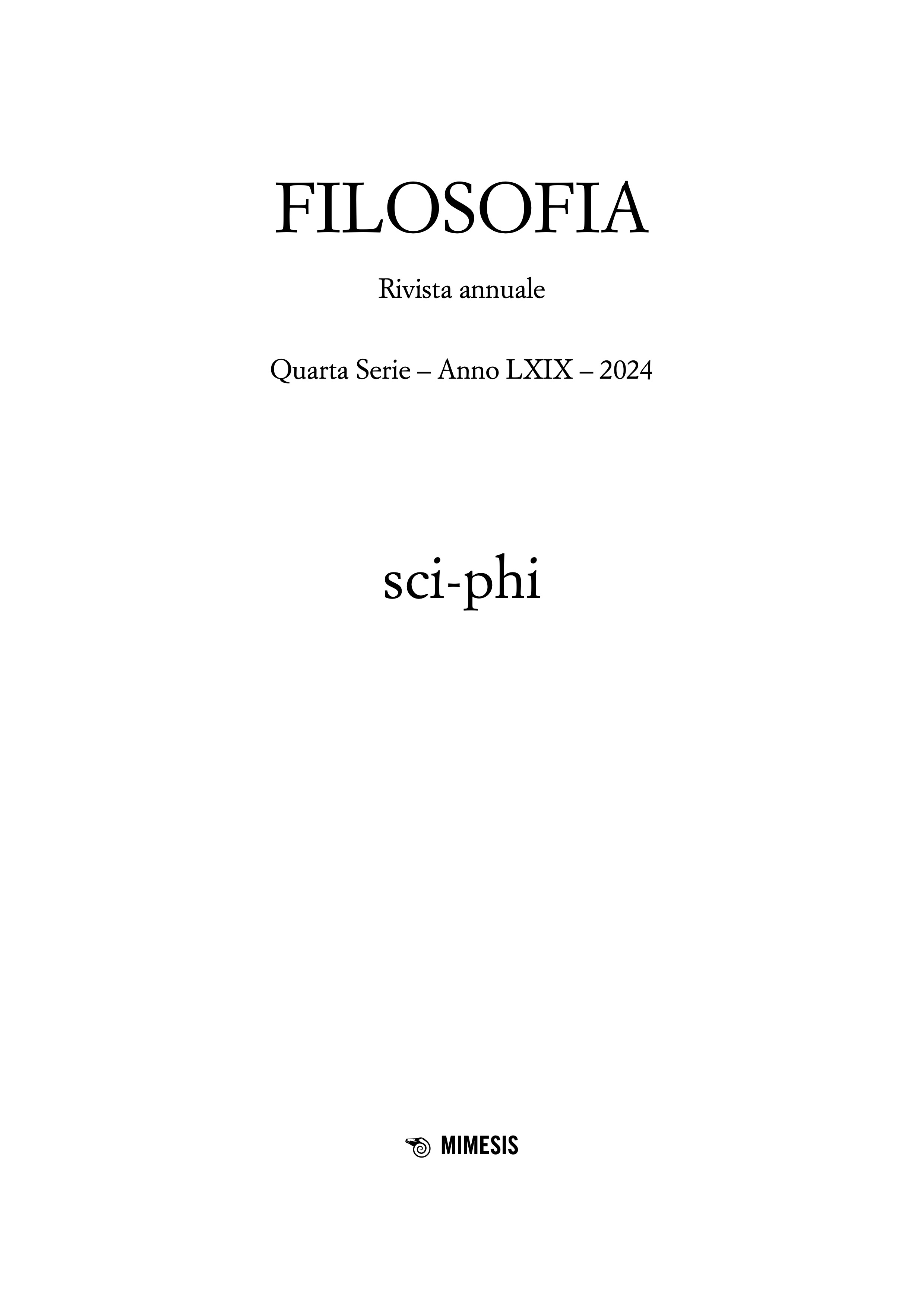Desincronizzazione. La scomparsa del Tempo in esempi di science-fiction
DOI:
https://doi.org/10.13135/2704-8195/11197Parole chiave:
Social Acceleration Theory, Accelerationism, Cultural Studies, Theory Fiction, Philosophy of TimeAbstract
Many original concepts have emerged within Social Acceleration Theory, from an ontological-social perspective on the one hand and from a biopolitical point of view on the other hand. In this direction, the categories of synchronization and desynchronization, which will be at the center of our research, point out the way to the understanding of ‘Social Time’ as a process of government over human temporalities. It is possible, to represent ‘synchronization’ and ‘desynchronization’, to draw inspiration from science-fiction contemporary literature and imagery. Suggestions and insights concerning, for example, the disappearance of Time in Guido Morselli, Stephen King and Han Song’s works will shed light on the philosophical potentiality of science-fiction; at the same time, they will give us the opportunity to formulate some final questions concerning ‘synchronization’ and ‘desynchronization’. How could we distinguish an absolute desynchronization from a relative one? How, in addition, is it possible to conceive an active emancipation from Social Time in not-dystopian terms? Science-fiction and philosophy seem, in the perspective employed, to proceed in parallel, updating ontological-political-social categories suitable to analyze power, society and human actors.
Downloads
Riferimenti bibliografici
Astone, Giorgio. 2019. “Sull’accelerazione sociale dell’oblio. Esperienze senza tempo per un’etica dell’immanenza”, Lo Sguardo 29, n. II: 111-139.
Augé, Marc. 2009. Nonluoghi. Introduzione a una antropologia della surmodernità. Tr. it. Carlo Milani. Milano: Elèuthera.
Calasso, Roberto. 2003. Cento lettere a uno sconosciuto. Milano: Adelphi.
Cancelli, Tiziano. 2020. How to accelerate. Introduzione all’accelerazionismo. Roma: Tlon. Davis, Jeremy. 2022, “Severed Minds”, The Philosopher’s Magazine 97: 112-115.
Durkeim, Émile. 1973. Le forme elementari della vita religiosa. Il sistema totemico in Australia. Tr. it. Enzo Navarra. Roma: Newton Compton.
Gergen, Kenneth. 2000. The Saturated Self. Dilemmas of Identity in Contemporary Life, New York: Basic Books.
——— 2009. Relational Being. Beyond Self and Community. Oxford: Oxford University Press.
Heidegger, Martin. 2015. Kant e il problema della metafisica. Tr. it. Maria Elena Reina. Roma- Bari: Laterza.
Hsu, Eric. 2014. “The sociology of sleep and the measure of social acceleration”, Time & Society 23, n. 2: 212- 234.
Kaye, Sharon. 2007. Lost and Philosophy. The Island Has Its Reasons. Hoboken: John Wiley & Sons;
——— 2010. Ultimate Lost and Philosophy. Think Together, Die Alone, Hoboken: John Wiley & Sons.
King, Stephen. 2018. The Langoliers. Tr. it. Tullio Dobner. Milano: Sperling & Kupfer.
Mackay, Robin, Avanessian, Armen, a cura di. 2014. #Accelerate. The accelerationist reader. Falmouth: Urbanomic.
McNeill, John, Engelke, Peter. 2014. The Great Acceleration. An Environmental History of the Anthropocene since 1945. Cambridge: Harvard University Press.
Manzocco, Roberto. 2010. Pensare Lost. L’enigma della vita e i segreti dell’isola. Milano: Mimesis. Matheson, Richard. 2020. Io sono leggenda. Tr. it. Giovanna Scocchera. Milano: Mondadori.
Morselli, Guido. 2012. Dissipatio H. G.. Milano: Adelphi.
Noys, Benjamin. 2014. Malign Velocities. Accelerationism and Capitalism, Winchester: Zero Books.
Olivari, Francesco. 2014. Guido Morselli. Uno scrittore senza destinatario. Milano: Jaca Book. Panetta, Maria. 2017. “Il senso del tragico in Dissipatio H. G.: la catastrofe dell’incomunicabilità”, Diacritica 17, n. 5: 49-64.
Perotta, Tom. 2015. The Leftovers. Svaniti nel nulla. Roma: E/O.
Rosa, Hartmut. 2009. “Social Acceleration: Ethical and political consequences of a desynchronized high-speed society” in High-speed society. Social acceleration, power, and modernity, Rosa Hartmut, Scheuerman William, a cura di, 77-111, University Park: The Pennsylvania State University Press.
——— 2010. Alienation and Acceleration. Towards a critical theory of late-modern temporality. Copenhagen: NSU Press.
——— 2013. Social Acceleration. A new theory of modernity. New York: Columbia University Press.
——— 2017. “De-Synchronization, Dynamic Stabilization, Dispositional Squeeze; The problem of Temporal Mismatch”, in The Sociology of Speed. Digital, Organizational, and Social Temporalities, Wajcman Judy, Dodd Nigel, a cura di, 25-41, Oxford: Oxford University Press.
——— 2019. Resonance. A Sociology of Our Relationship to the World. Cambridge: Polity. Rosa, Hartmut, Scheuerman, William, a cura di. 2009. High-speed society. Social acceleration, power, and modernity. University Park: The Pennsylvania State University Press.
Regazzoni, Simone. 2010. La filosofia di Lost. Firenze: Ponte alle Grazie.
Song, Han. 2020. I mattoni della rinascita. Tr. it. Lorenzo Andolfatto. Roma: Future Fiction. Strawson, Galen. 2004. “Against Narrativity”, Ratio 17, n. 4: 428-452;
——— 2008. “Episodic Ethics”, in Real Materialism and other essays, 209-231. Oxford: Oxford University Press.
Srnicek, Nick, Williams, Alex. 2015. Inventing the Future: Postcapitalism and a World Without Work. New York.
——— 2017. Accelerate Manifesto. For an Accelerationist Politics. Città del Messico: Gato Negro.
Srnicek, Nick, Hester, Helen. 2023. After Work. A History of the Home and the Fight for Free Time. New York: Verso.
Szendy, Peter. 2013. Kant in the land of extraterrestrials. Cosmopolitical philosofictions. New York: Fordham University Press.
Villani, Paola. 2012. Un mistico ribelle. A-teologia e scrittura in Guido Morselli. Napoli: Graus.
Williams, Simon. 2014. “The sociology of sleep and the measure of social acceleration: A rejoinder to Hsu”, Time & Society 23, n. 3: 309-316.
Filmografia
Abrams, Jeffrey, Lindelof, Damon, Lieber, Jeffrey. 2004-2010. Lost. Donner, Richard. 1963. Nightmare at 20.000 feet.
Holland, Tom. 1995. The Langoliers.
Lawrence, Francis. 2007. I Am Legend.
Miller, George. 1983. Segment Four in Lands, John, Spielberg, Steven, Dante, Joe, Miller, George, Twilight Zone. The Movie.
Perrotta, Tom, Lindelof, Damon. 2014-2017. The Leftovers. Ragona, Ubaldo. 1964. The Last Man on Earth.
Sagal, Boris. 1971. The Omega Man.
Stiller, Ben, McArdle, Aoife. 2022. Severance.
Yaitanes, Greg. 2019. Nightmare at 30.000 feet.
##submission.downloads##
Pubblicato
Come citare
Fascicolo
Sezione
Licenza
Copyright (c) 2024 Giorgio Astone

TQuesto lavoro è fornito con la licenza Creative Commons Attribuzione 4.0 Internazionale.
Filosofia applica una licenza Creative Commons Attribution 4.0 International License a tutto il materiale pubblicato.




